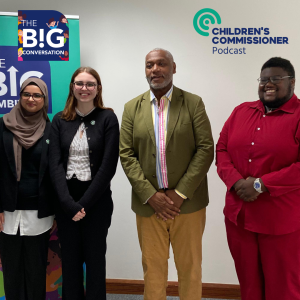“The youth voice is critical to designing services that are appropriate for young people. Everyone listens, but can they hear?”
Last year I visited the Paediatric Critical Care Unit at Royal London Hospital to see their life changing work and to meet Professor Martin Griffiths CBE, a consultant major trauma surgeon at Barts Health NHS Trust and Clinical Director for Violence Reduction at NHS London. It was brilliant to find out about his team’s amazing work to provide critical care for children who’ve been victims of serious violence and to protect and divert children away from crime and exploitation.
To share more about this work, I invited Martin to speak to my Youth Ambassadors Aaliya, Penelope and Emmanuel on my Big Conversation Podcast to discuss the changing nature of youth violence and the need to design services that reflect young people’s experiences.
Content warning: topics discussed include knife crime, masculinity, relationships, non-fatal strangulation and external influences including social media.
One of the key changes to youth violence that Martin shared is that he has seen a decline in the age of young people he sees, with the average age of someone who comes to his emergency department now being 16: “I’ve been doing trauma care for a long time and now it’s become an issue of children attacking children: children stabbing children for childish reasons. Often over shame or about respect – or about nothing,” he said.
He also discussed social media and external influences and their role in tapping into men’s feelings of insecurity and their attitudes towards women, with violence becoming normalised by what young people see in the media: “Social media is corrosive. Influencers have made a lot of money and raise their profile by tapping into the insecurities of men who haven’t got the social skills to interact reasonably with partners and people, and they feed into these negative vibes about not being worthy.
“I see it in the way in which people talk, [the way] boys talk to women, the way boys treat women, the way boys treat their partners and their parents. I’ve seen this real change in the way in which young boys talk about their mums and their sisters.”
Having recently published stark new research on children’s exposure to pornography and its impact on their relationships, attitudes and behaviours with one another, the podcast shares thoughts that builds on concerns that children and young people have raised with me in my tenure about how seeing physically aggressive sex online affects boys and girls in different but equally serious ways.
Of the children and young people surveyed in May 2025 for my research – shortly before stronger protections were introduced by Ofcom in July – 58% of young men said they had seen porn online depicting a woman being strangled during sex, but just 28% said they had seen a man being strangled. Similarly, 49% of young women said they had seen a woman being strangled in online porn, and just 14% said they’d seen it depicting a man being strangled.
Within the podcast Martin discusses non-fatal strangulation and the increasing commonality of young people believing it is often part of a ‘normal sexual relationship’: “If you look at where influencers are coming from – social media, pornography, socialized expectation – you are supposed to choke your partner and like being choked. I get asked about whether it’s the right thing to do, how to do it safely, which is a crazy question because it can cause significant problems with brain circulation. And ‘if I don’t like it, am I frigid?’ No, you are just normal. But what’s happened is that’s become normalized.”
My Ambassadors also shared their thoughts on the themes in particular toxic masculinity and boys attitudes towards girls: “I think it’s become such a big problem, this toxic masculinity content is on everyone’s social media and I think it’s become so normalized. It’s almost that if men don’t act in this way, then they’re not proper men.” Aaliya, 19
“We’ve seen it in our universities. I’ve met with people that have very radical views about how to treat women. I think that is fuelled by the epidemic of misogyny and the rise of Andrew Tate and the idea of the alpha male.” – Penelope, 19
The podcast provides insight into how we need to work collectively to reduce youth violence the work needed and solutions to put in place to support young people to have bright futures:
“ If we build cohesion and we build understanding and we work collaboratively together, things can change massively.”
Ensuring young people have a voice is essential to supporting them.
You can listen to The Big Conversation on Apple Podcasts, Spotify and Amazon/Audible Podcasts.






